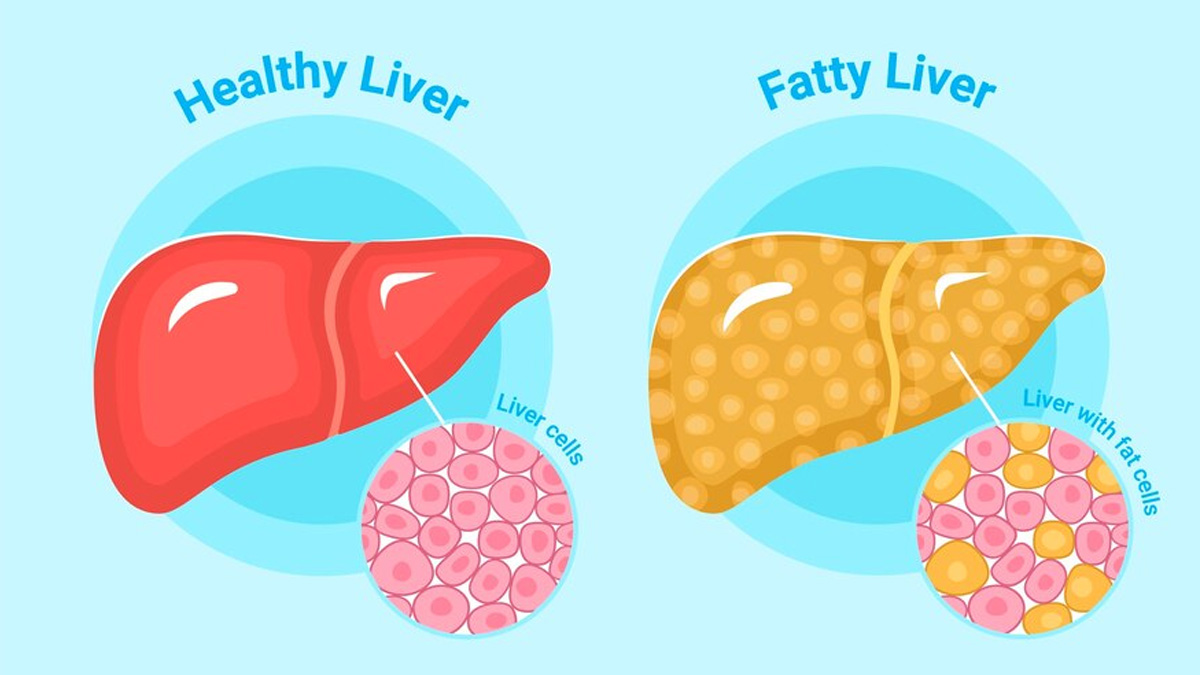
Fatty liver disease, including non-alcoholic fatty liver disease (NAFLD) cases have been surging in India and it is becoming more prevalent in young adults and children. It is not only common in India but is seen in many other parts of the world too.
Table of Content:-
In this condition, too much fat gets accumulated in the liver. When it happensoccurs to people who consume little to no alcohol, it is called NAFLD. But why is there a rise in cases of fatty liver?
Consultant – Gastroenterology, Dr Pavan Dhoble of Hinduja Hospital, Mumbai, lists several reasons that contribute to this trend.
Why is fatty liver prevalent in young adults and kids?
1. Dietary Changes:
Dietary habits of Indians have significantly changed, with an increased consumption of high-calorie, high-fat and processed foods. Sugar rich food, refined carbohydrates, unhealthy fats contribute to the piling of fat in the liver.
2. Sedentary Lifestyle:
Increased urbanisation, desk-bound jobs, never-ending screen time are some of the factors leading to a decrease in physical activity. Physical activities help burn the fat built up in the liver. Little to no movement can easily lead to fatty liver disease.
3. Obesity and Metabolic Syndrome:
According to a study by National Institutes of Health, US, half of the adult population of India has abdominal obesity and 12 percent of the country’s population is suffering from obesity. Obesity often comes with other metabolic risk factors like insulin resistance, hypertension and dyslipidemia, collectively known as metabolic syndrome which can incline to NAFLD.
Also read: Signs Of Childhood Obesity: What Parents Can Do
4. Genetic Predisposition:
Even after making changes in diet and lifestyle, some individuals are prone to fatty liver if genetic factors are included. Even the health and nutrition of the mother during the pregnancy can impact the risk of developing fatty liver disease.
5. Environmental Factors:
Exposure to toxins and pollution can affect the liver. According to the Journal of Hepatology, air pollution leads to fatty liver. Even the health and nutrition during pregnancy can impact the risk of developing fatty liver disease.
6. Other Medical Conditions:
Conditions like diabetes, insulin resistance, and certain hormonal disorders can increase the risk of fatty liver disease.

Diagnosis
Dr Dhoble shed some light on how fatty liver disease is diagnosed by saying, “The diagnosis of fatty liver disease often starts with a doctor's evaluation based on medical history, physical examination, and some initial tests.” The diagnosis of fatty liver disease can be done through blood tests, Ultrasound, Fibroscan, MRI, or liver biopsy in some cases.
Also read: Fatty Liver: Tips To Avoid Fatty Liver Disease In Children
Treatment and Self-Care
According to Dr Dhoble, the focus is primarily on managing and preventing the progression of the disease. There's no specific medication to cure fatty liver disease, but lifestyle changes play a crucial role in its treatment.
1. Weight Loss: For the people who are overweight or obese, gradual weight loss through a healthy diet and regular exercise is the best treatment. Even a moderate weight loss can significantly reduce fat piled up in the liver.
2. Healthy Diet: A diet of individuals suffering from fatty liver should include fruits, vegetables, whole grains, lean protein and healthy fats. Reducing the intake of sugar, refined and processed foods can help manage the disease.
3. Regular Exercise: Practicing regular exercise and doing it at least for 150 minutes per week can improve insulin sensitivity and reduce liver fat.
4. Avoidance of Alcohol: Avoiding alcohol is most vital to save your liver from damage for the people suffering from fatty liver.
5. Managing Medical Conditions: Treating underlying conditions like diabetes, high blood pressure, and high cholesterol can help improve liver health.
6. Monitoring and Follow-up: Regular check-ups and monitoring of liver function and lifestyle habits are essential to track progress and make necessary adjustments in treatment.
“In some cases, medications or supplements may be prescribed, but these are typically used to manage symptoms or associated conditions rather than to directly treat fatty liver disease itself. It's important for individuals diagnosed with fatty liver disease to work closely with healthcare professionals to develop a personalised treatment plan tailored to their specific needs,” Dr Dhoble concluded.
Also watch this video
Read Next
Amid Covid-19 Surge Health Ministry Steps Up Fight Against Zoonotic Diseases: What Are They?
How we keep this article up to date:
We work with experts and keep a close eye on the latest in health and wellness. Whenever there is a new research or helpful information, we update our articles with accurate and useful advice.
Current Version
